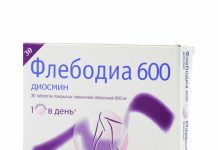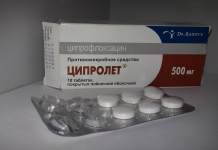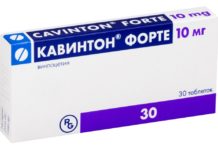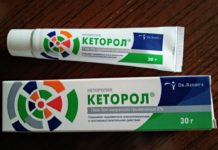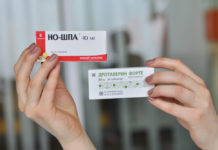Synecode syrup helps people of all ages fight cough. It is suitable for the treatment of both children and adults. But with self-administration, it is able to cause side effects that will not affect the state of health in the best way.
Material Content:
- 1 Syrup Sinekod: release form, composition
- 2 Pharmacological properties and indications for use
- 3 At what age can children be given
- 4 What cough to take syrup: dry or wet?
- 5 Instructions for use for children
- 6 The use of synecod syrup during pregnancy
- 7 Drug Interactions with Other Drugs
- 8 Proper storage conditions for syrup
- 9 Contraindications, side effects
- 10 Analogs
Syrup Sinekod: release form, composition
The medicine has a powerful effect due to the presence of active compounds in the composition.
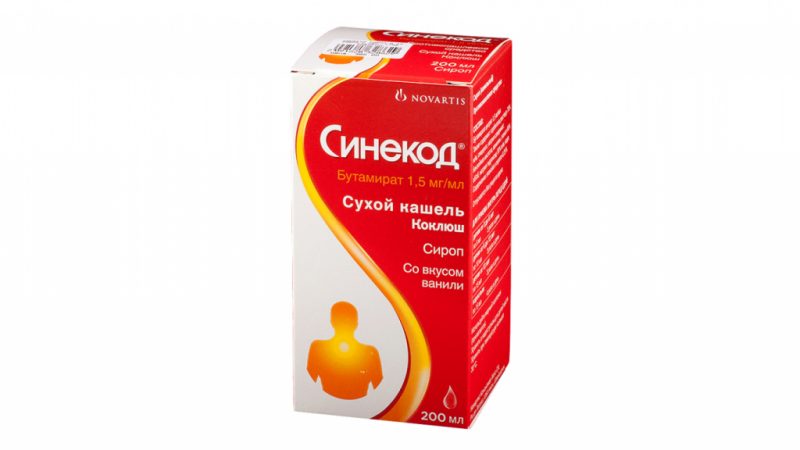
The syrup includes:
- butamirate citrate (active substance);
- glycerol (to maintain the dosage form);
- sodium saccharinate (for a pleasant taste);
- vanillin (creates aroma);
- benzoic acid (does not allow quick deterioration);
- water (dilutes the drug to a liquid).
The syrup has a viscous but liquid consistency, and when dried it becomes sticky. It is poured into 200 ml bottles, which are packed in packs of thin cardboard.
Pharmacological properties and indications for use
Cough Syrup Sinecod acts as a bronchodilator. It relieves spasm of the respiratory tract, expanding their lumen and facilitating the flow of oxygen into the lungs. Also, the drug acts at a neuronal level, inhibiting the cough center in the brain. This reduces the number of seizures. In the study of respiration indicators before and after taking the medicine, their change for the better under the influence of active substances is noticeable.
The drug does not contain codeine, therefore it is not able to cause dependence even with prolonged treatment.
Its action occurs quickly enough, and the maximum falls on 1.5 hours from ingestion. It does not accumulate in the blood or respiratory system, which reduces the risk of overdose.
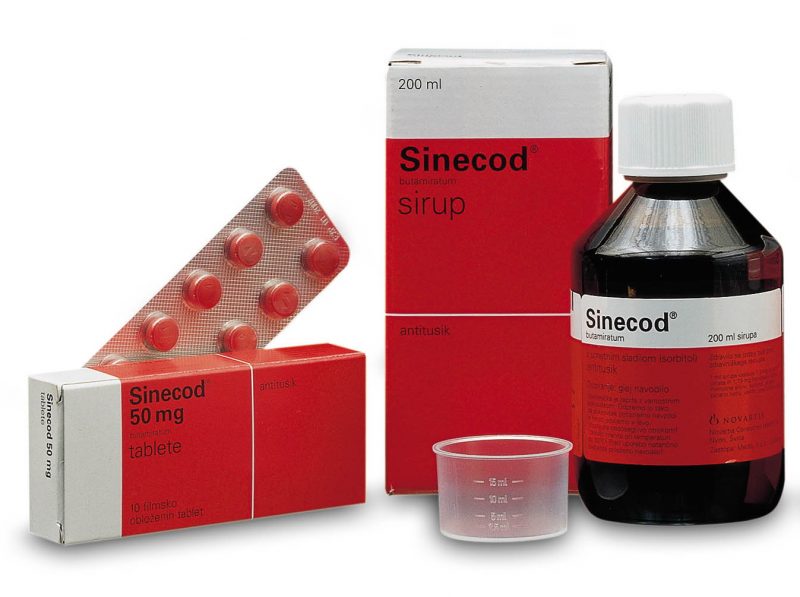
Sinecode has a whole list of indications due to the strong active substance and the speed of the onset of the effect.
These conditions include:
- dry bothersome cough of unknown origin;
- acute and chronic bronchitis;
- whooping cough;
- tracheitis;
- lung pathologies associated with smoking.
In the presence of one of the indications, the doctor considers Sinecode as a drug for treatment. Its purpose is carried out after taking into account all the concomitant factors, such as age, general condition of the patient and other existing diseases.
At what age can children be given
Synecod syrup is not used in the treatment of children until they reach the age of three. This is due to the high concentration of the active substance in the composition of the drug. But from 2 months it is allowed to use the medicine in the form of drops. In it, the number of active components is slightly lower. Prescribing a drug to a child up to 60 days of life is prohibited. It can have a toxic effect on the liver or lead to the development of complications from the respiratory system.
What cough to take syrup: dry or wet?
The drug is used only for dry cough. This is due to the features of its action. It blocks the neurons responsible for seizures in a patient. If at the same time the patient accumulates sputum in the lungs, it stops moving away. Pathogenic microorganisms will begin to multiply inside, which will lead to the progression of pathology. This will worsen your well-being, and delay recovery.
It is interesting:linkas cough syrup for children
Instructions for use for children
Instructions for the drug are enclosed in the packaging in printed form. Its abridged version is applied on a cardboard box outside. The dosage that is indicated should be adjusted by the attending physician for each case of the disease individually.
Dosage for children
The dosage of the syrup depends on the age of the child, the type of disease, the general condition of the body and associated pathologies.
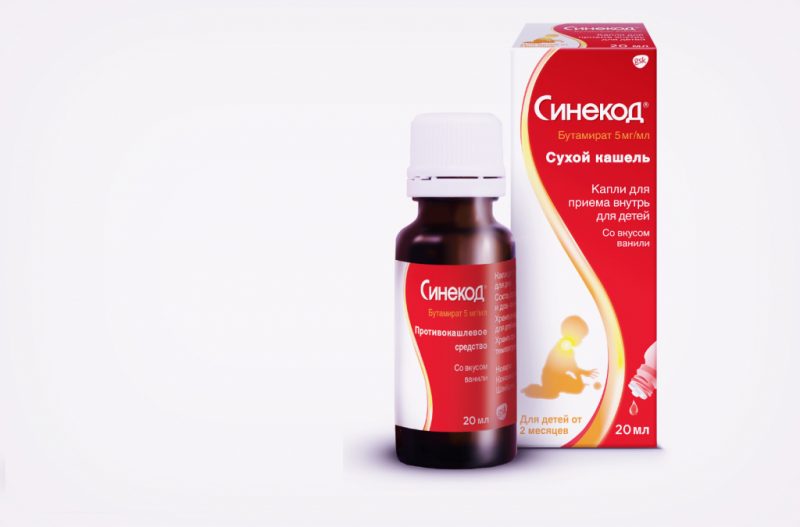
The average amount of the drug in the treatment of different groups of children is as follows:
- from 3 to 6 years - 1 teaspoon (5 ml) three times a day;
- from 6 to 12 years - 2 teaspoons (10 ml) three times a day;
- from 12 years and older - 3 teaspoons (15 ml) three times a day.
The course of treatment usually does not exceed a week. If no improvement is observed during this time, you should consult your doctor to increase the dose or select a stronger analogue. Self-replacement of the drug is unacceptable.
How to take syrup - before, after or with food?
The time of taking the drug is not associated with eating. While eating, this is not very convenient, and if you use it before dinner, then the sweet taste can upset your appetite. Therefore, children should be given syrup after they have eaten what is supposed to be normal for a specific period of time.
The use of synecod syrup during pregnancy
Use of the drug during pregnancy is limited due to the high activity of the components in its composition. Doctors are not allowed to take it in the first trimester because of the risk of harming the fetus, since during this period the laying of the main organs and systems takes place, as well as the formation of a protective barrier around it.
In the second and third trimester, the fetus is reliably protected by the placenta, through which the active substances of the drug do not enter. Therefore, it can be prescribed to expectant mothers according to indications.
Drug Interactions with Other Drugs
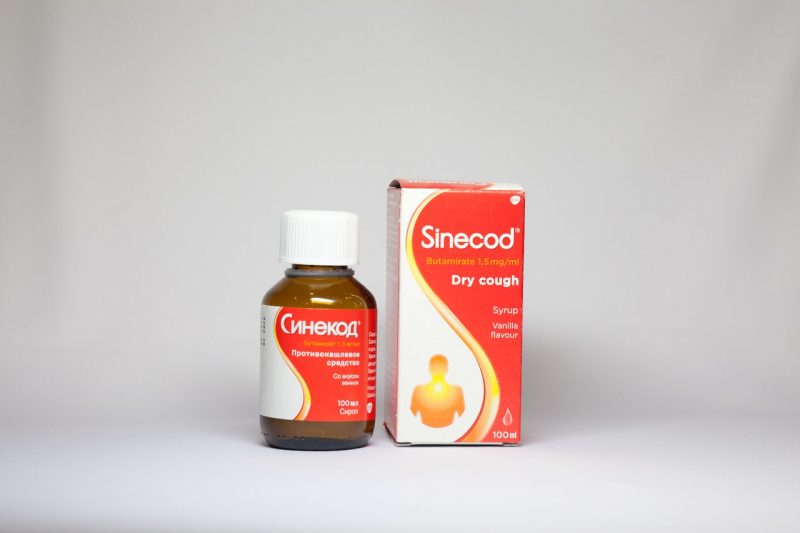
Sinecode does not form links with other drugs, nor does it affect their activity. But it is not used simultaneously with mucolytic agents. They help to increase the amount of sputum that should be evacuated from the lungs.The synecode blocks this due to the effect on the neurons of the brain. Such an interaction can worsen the patient's condition and well-being, therefore, is not used in therapeutic practice.
Proper storage conditions for syrup
The syrup should be stored in a darkened area where direct sunlight does not fall. It is preferable to put it in a cool place where the temperature never reaches 30 degrees, but never drops below 5. The medicine should not be accessible to children, as it contains active components that can be harmful in case of an overdose.
Contraindications, side effects
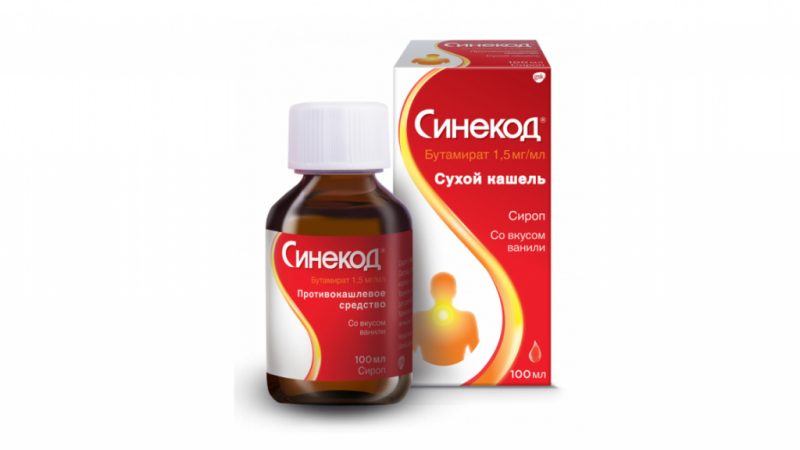
Due to its high efficacy, Synecode baby syrup is limited in use in some categories of patients.
These include:
- children under 3 years old;
- pregnant women for up to 12 weeks;
- patients with bleeding in the lungs;
- people allergic to one of the components in the composition of the medicine;
- wet cough patients.
In order for the doctor to correctly prescribe treatment, it is necessary to inform him of all situations that may serve as a contraindication to the use of medicines.
Due to the high activity of the active substances, Sinecode can cause side effects.
The most common include:
- headache;
- drowsiness;
- dizziness;
- nausea;
- allergic reactions in the form of itching, urticaria, Quincke's edema.
When side effects occur, it is necessary to assess the degree of their influence on the patient's quality of life and take into account their severity.
If the patient cannot perform his standard actions because of his condition, it is worthwhile to consult a doctor to select a similar drug or adjust the dose.
If you are sleepy, driving is strictly prohibited.
In some cases, an overdose of the drug is possible.
In this case, several signs of it arise:
- nausea;
- severe drowsiness;
- dizziness up to a loss of orientation in space.
If the patient has found obvious symptoms of an overdose, you should drink a large amount of activated charcoal and water, and also seek help from the hospital.
Analogs
Drugs with a similar effect are produced only abroad. In Russia, these drugs are not released.
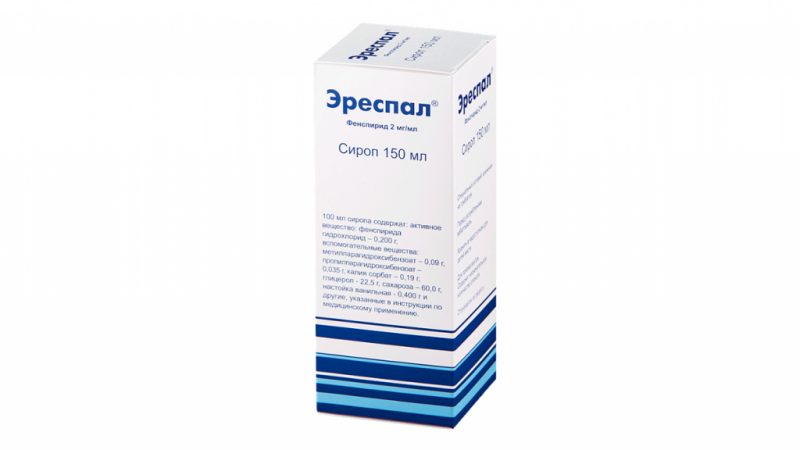
Medicines with a similar effect include:
- Fluditec;
- Stoptussin;
- Erespal;
- Ascoril;
- Panatus Forte;
- Omnitus.
All of them are used as antitussive drugs. Sinecod's analogs are close to it not only in action, but also in cost. The exception is Erespal due to the unique composition and production technology.
It is not recommended to replace the drug with a similar one on its own, since they have a different composition, effect and dosage, as well as side effects. The choice of medication is best entrusted to the attending physician. If the patient has doubts about the correctness of the appointment, it is worth consulting with another specialist, but do not look for a remedy yourself. Otherwise, the risk of complications and adverse events is high.
Sinecode is a powerful cough suppressant, but is used only for indications. It is not used for very young children due to the high concentration of the active substance. Existing analogues differ in composition, so they can not be considered a copy of the drug and independently change.


